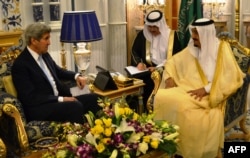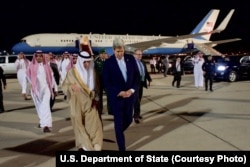Libya's new government and its security challenges are the focus for diplomats Monday as they gather in Vienna to discuss the situation in the country that has been in a state of chaos since leader Moammar Gadhafi was toppled and killed in 2011.
U.S. Secretary of State John Kerry and Italian Foreign Minister Paolo Gentiloni are co-hosting the session aimed at supporting the Government of National Accord that Western powers hope can unite Libya.
The talks follow Kerry's visit Sunday to Saudi Arabia where he sought that government's support in strengthening a cessation of hostilities agreement between Syrian government forces and rebels ahead of broader talks on regional crises later this week.
Saudi Arabia meeting
Kerry, trying to shore up support for the shaky cease-fire in Syria, met with Saudi King Salman, whose country has been a key supporter of rebels fighting to overthrow Syrian President Bashar al-Assad.
The top U.S. diplomat and his Saudi counterpart, Adel al-Jubeir, discussed developments in Syria, the official Saudi Press Agency reported.
Later, the top U.S. diplomat will fly to Vienna where he and Italian Foreign Minister Paolo Gentiloni will co-host a ministerial meeting on security and support for Libya's new government.
Western powers hope Libya’s Government of National Accord can unite the country, which has been in a state of chaos since leader Moammar Gadhafi was toppled and killed in 2011.
On Tuesday, the 17-nation International Syria Support Group (ISSG) will convene in Vienna to discuss the stalled political talks, difficulties in maintaining the February cease-fire and the U.N.'s uneven results in delivering humanitarian aid.
However, the Syrian government's recent military advances may diminish the ability to restart political talks seen as the best hope for ending the war.
“Not all of the trend lines in Syria are going in the right direction,” said State Department spokesman John Kirby.
Kirby commented on Friday, shortly before Kerry departed on a two-week trip to the Middle East, Europe and Asia, where he will focus on issues including unrest in Syria as well as in Libya.
Syria cease-fire talks
In Syria, the U.S. and Russia began stepping in to broker a series of localized cease-fires in late April, to help keep a nationwide cessation of hostilities enacted in February from fraying.
While the overall level of fighting between the government and rebels is down, tensions between the two sides have continued to flare.
In late April, another round of U.N.-facilitated talks on a political transition in Syria ended with no face-to-face meeting between the government and the opposition. It is unclear when the next round of so-called proximity talks will take place.
In an interview with Russia’s Sputnik news agency, U.N. Syria envoy Staffan de Mistura said he would await the outcome of the Syria support group’s session before convening another round of proximity talks.
Some analysts say Syria’s military dynamics could hamper progress in proximity talks.
What matters is the “leverage that you bring into the room,” said Atlantic Council Middle East analyst Nussaibah Younis. “With the backing of Russia, the Assad regime has managed to make some real progress in its fight against the rebels,” and, as a result, will be unwilling to compromise, she said.
Russia said it would use Tuesday’s session to call for an end to commingling between terrorist groups and rebels in Syria.
Other conflicts
Additionally, while Kerry is in Vienna, the U.S., Russia and France will focus on an effort to help stabilize Nagorno-Karabakh, a disputed territory between Azerbaijan and Armenia, which is officially part of Azerbaijan.
In April, the region suffered one of its worst outbreaks of violence in years.
After Vienna, he will attend a NATO ministerial meeting in Brussels and then will travel to Myanmar in a show of U.S. support for the country’s newly elected government.
In the following week, Kerry will join President Barack Obama in Vietnam.






